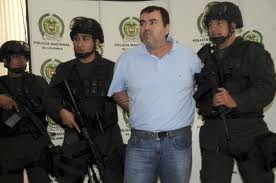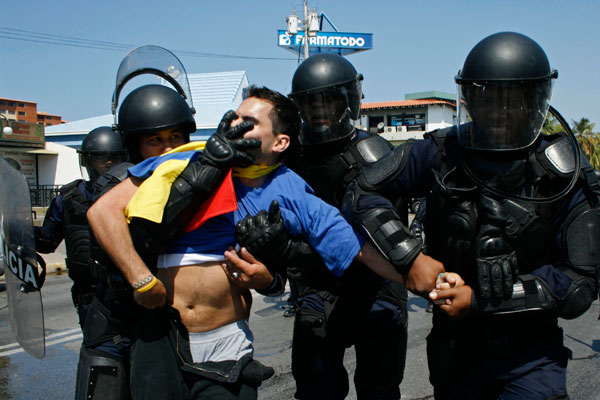
By Thor Halvorssen and Pedro Pizano
Colombian president Juan Manuel Santos has announced the extradition of Walid Makled, a Venezuelan drug kingpin, from Colombia to Venezuela. This will take place in the next few weeks, setting a frightening precedent with monumental consequences for Colombia, Venezuela, and, especially, human rights and the fight against torture.
Both the United States and the Venezuelan government want to get their hands on Makled -- for altogether different purposes. Hugo Chávez is desperate to muzzle Makled inasmuch as he ran a multi-billion dollar drug-trafficking operation from his base in Venezuela and, according to him, his payroll includes top Venezuelan officials, Chávez family members, the top military brass, and an army of mid-level apparatchiks. Extradition to the U.S. would mean a trial that would create world news and would likely reveal Hugo Chávez as the new millennium's Manuel Noriega.

So eager is Chávez to get Makled that he has transformed himself from behaving like an impetuous and belligerent neighbor to becoming a gracious sycophant of the Colombian government. He has made an unprecedented offer to pay back millions of dollars of debt owed to Colombia, reestablish gas lines to the country, and process the extradition of Colombian guerrillas hiding out Venezuela. The Chávez's administration overdrive efforts to convince Colombia have paid off.
The impact of this case, as large as it may be for regional politics, is not as historic as the precedent that would be set if countries began to extradite individuals to Venezuela, where torture is often used in dealing with prisoners.
Article 3 of the UN Convention against Torture establishes that no state shall expel, return, or extradite a person to another state where there are substantial grounds for believing that he would be in danger of being subjected to torture.
And, indeed, there is good reason to believe that Makled could be tortured in Venezuela.
In 2003, the Inter-American Commission of Human Rights (IACHR) reported the findings of an NGO, Red de Apoyo por la Justicia y la Paz, which documented that Venezuelan state security officials participated in 145 cases of torture and cruel, inhuman or degrading treatment between 1999 and early 2003. Since then, the IACHR has not been permitted into Venezuela, and it has assumed that conditions have worsened dramatically. Let's repeat that: the Chávez government has denied entry to the most important multilateral body in the hemisphere that deals with human rights.
In 2004, Venezuela's ombudsman German Mundarain publically acknowledged that security forces had tortured protesters detained during anti-government demonstrations -- a story widely covered. These instances echo numerous reports, complaints received by NGOs, and media coverage that concluded that torture is commonplace in today's Venezuela. But there is nothing like personal experience to back it up: Since 2004 the Human Rights Foundation (HRF) has issued several reports establishing the use of torture against the Chávez's government opponents. See, for example, the cases of Fort Mara and Humberto Quintero.

Some critics argue that Makled should not be extradited to the U.S. either, as torture has been considered legal stateside under certain circumstances. But to compare rule of law in the U.S. to rule of law in Venezuela would be folly -- the American judicial system is independent, the system of appeals is firmly in place, and the country has a vibrant free press. The rules of the game are different in Venezuela, where a judge can be imprisoned when the president does not like her ruling, or where a union worker can be jailed for leading a peaceful strike against a state-owned company. Not to mention media being shut down (such as RCTV); journalists imprisoned (such as Gustavo Azócar); journalists assaulted (such as Marta Colomina); or, persecuted (such as Alberto Federico Ravell).
Isolated incidents, some wish. Well, imagine the following scenario: the Chief Justice of the Supreme Court of the United States opens the judicial session chanting "Three cheers for Obama!" followed by the entire court in unison: "Obama, Obama, Obama!" Check out the video below to get a taste of the independence of the Venezuelan judiciary.
Santos must not extradite Makled to Venezuela. In doing so, Colombia would be violating the UN Convention Against Torture. Sending this criminal whistle-blower to Venezuela would also underline that Chávez's petro-dollars can buy complicity, allegiance, and silence.
Thor Halvorssen is president of the New York-based Human Rights Foundation and founder and CEO of the Oslo Freedom Forum. Follow him on Twitter and on Facebook. Pedro Pizano is HRF's public advocacy coordinator. Follow him on Twitter and on Facebook.